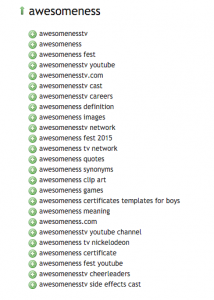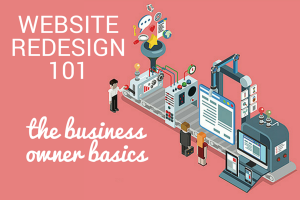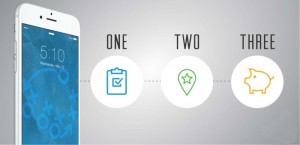— July 7, 2017

via Unsplash
As a naive young email marketer, I used to think that the only way to achieve success in email marketing was to act like you’re a major player, even if you were just a one person show of an online store. Let me tell you now, after working on emails for 10 years, this is wrong.
The problem with 95% of Ecommerce emails is that they don’t appeal to me as an individual. There’s only the “official company opinions” rather than the sentiments of the person behind it, blasting out emails that feel that they’re more about them than about you, just another subscriber in their database to make money from.
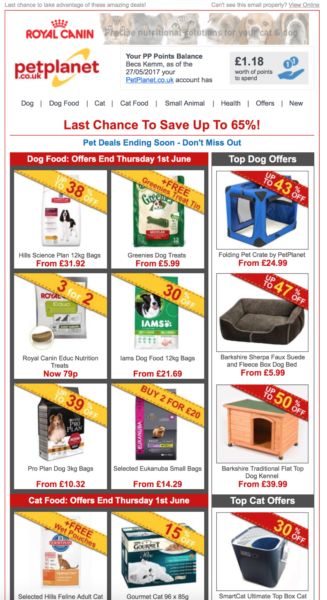
How not to do email: Putting all of your products in, with no context and hoping for the best
Small businesses have a hard time competing with the Amazons of this world – price, delivery times and choice make it a challenge. But here’s something that Amazon doesn’t have: a personality. They’re a big and ultimately faceless brand, basically a load of computers and robots creating content blocks in an email based on your interactions. And that’s your differentiator. You’re a human, with opinions, and you’ve carefully curated products to sell in your small online store. In other words:
BE HUMAN.
But what does it mean to be a human in email?
Well for a start, emails with personality are a lot more appealing among the slew of one-sided “buy all the things from our store” emails that fill our inboxes on a daily basis. In fact, newsletters have seen a resurgence in popularity of late, with Lena Dunham’s Lenny Letter and Domestic Sluttery being two of my favorites. The latter uses affiliate links to generate an income, but it never feels wrong or out of place – the products are carefully curated.
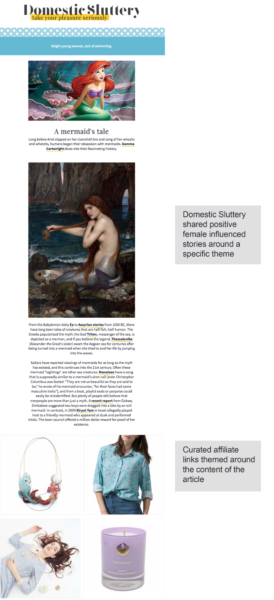
“People like people more than brands. The big thing that works about my newsletter is that it’s created by one human being and reflects one human being’s point of view.”
Ann Friedman of Ann Friedman Weekly (Source)
How can you add value?
Now of course, as a business you’ll want to use email to leverage your sales, but it’s good to have a “softly softly” approach sometimes because no-one likes to be sold to all of the time. Think about writing emails that add some value to the recipient whilst also suggesting some products that tie into the theme.
Adding value can be mutually beneficial – your subscribers won’t feel like you’re constantly trying to make money from them, which means they’ll be more likely to remain longer on your list and engage with your email. This means you’ll have more opportunity to increase Customer Lifetime Value as well as maintaining high deliverability levels (which improves when more subscribers open and click your emails).
So, what type of content can you share in your emails to make it useful and informative, whilst still having a sales goal to achieve? The key is to think about how your products could be applied in a situation and how current trends can positively affect that.
Seasonality is a huge factor in many purchasing decisions. Take Spring: it can be used in many ways:
- If you’re selling food products, you might talk about eating lighter foods. As the temperature increases, you can suggest recipes that use ingredients that you sell, or you could even discuss the most suitable items to take on a picnic.
- Selling homewares? In the spring, people may update their homes and choose lighter, brighter colors for textiles to reflect new plant growth outside and longer daylight hours.
- And don’t forget that even businesses selling things like cleaning products can benefit from time of year themes. Spring cleaning anyone?
How-to guides can also be applied to many different situations and are perfect for both newsletters and following up on specific purchases. Ideally, you’ll recommend multiple products in your range within the how-to, so you optimize the opportunity for people to buy at least one of them. Here are some ideas for you:
- Jewelry store? What about a tutorial on how to accessorize for a festival – you could talk about the key trends and how to create multiple looks by changing a few things.
- Sell clothing? How about taking one of the items and using that as the centerpiece for a number of outfits for different occasions? “One dress, four looks” and talk about how you style them in such a way too (does it flatter a certain shape? Does an accessory make the outfit more dressed up?). Don’t just suggest products here, explain the whys.
Imagine you’re in a physical store, and an assistant helps you choose the right product. It’s likely that during your conversation they’ll explain the benefits of a particular product and how it meets your specific requirements. With email, it’s pretty much a one-way conversation, but that doesn’t mean that you can’t be helpful. Consider:
- How does this item solve a problem for my subscriber?
- What are its features? Explain them in human terms, don’t just share the technical specifications.
- Do you have product reviews? Think about how you could add these to your email to back up what you’re saying. Reviews can add a huge amount of trust and again, reinforces the human aspect of your content.
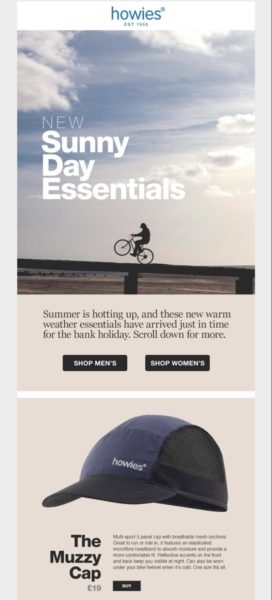
A great example of how this Howies cap solves a problem
Be opinionated
As a small business, it’s more likely that your store will reflect your own personal interests, or at least, you’ll be equipped with some in-depth knowledge of the types of products that you sell. With this in mind, your store’s brand should be a piece of you. It could be as simple as writing a “why we love this product” snippet next to an item. And it’s also ok to have an opinion that people might disagree with, occasionally – opinions are individual!
Having an opinion helps to establish you as a person in a position of authority and expertise in a subject, and people respect that. As a small business, it’s likely that people will ask for your advice before purchase. No-one emails Amazon and asks them for product advice (or if they do, they won’t get a response) but an approachable specialist would help a customer to feel at ease, which will, in turn, be rewarded with customer loyalty. You could do this in a couple of ways:
- Including an occasional help column where customers write for advice will demonstrate the breadth of your knowledge to your subscribers rather than just on a one-to-one basis. This will also help to educate and inform (more value add). This is especially great for stores within the pet and car care sectors.
- Have you thought about comparing and reviewing products of a similar type? Give your opinions on what you think of their features and, if you feel comfortable, their negative points too. This reflects so much better than presenting a series of products where you don’t express any thoughts or feelings about them.
My favorite writing trick
It always helps to have an idea of who exactly your customers are so you can tailor your writing style to that group anyway – it’s easy nowadays to get age and gender information (Mailchimp offers this with connected Shopify stores for example) and that will help you to understand how receptive your audience is to certain types of content.
One of the best tips I ever received about copywriting was “write as if you were just writing to one person”. That means thinking about who that person is – what’s their name and what do they look like? Focus on that person in your mind and write copy as if you were writing only to them, rather than attempting to write something that tries to please every demographic in your subscriber list. Ask yourself what they might enjoy receiving from you and you’re halfway there. I find it’s a lot easier to write when you’ve got this kind of clarity.
Sharing is caring
You might also want to consider additional content – snippets about your life, what you’ve done at the weekend or other things you like. Back when Hush was a much smaller brand selling only sleepwear, the owner used to share her favourite monthly reads and why she enjoyed them, which tied in nicely with the theme of sleeping.
Innocent Drinks has a very popular newsletter that shares the weekly goings-on in their HQ, and gives a wonderful insight into the culture that they foster within the company. This type of “behind the scenes” sharing helps people to relate to you in a more meaningful way. Their brand style is quite funny/silly so they tend to share unusual things that have happened in their office.

A snippet from the Innocent Drinks newsletter
Finally, as a small store owner, you’re heavily reliant on your lovely customers and it’s important to give them the VIP treatment. Have they shared a photo of them and their purchase? Did you get some awesome feedback? Make sure that you share these little tidbits on emails for all to see (check it’s ok with that customer first). This will make customers feel involved in your success, whilst also having the benefit of encouraging others to come forward and share with you. Humans can be grateful, robots cannot.
Digital & Social Articles on Business 2 Community
(44)

